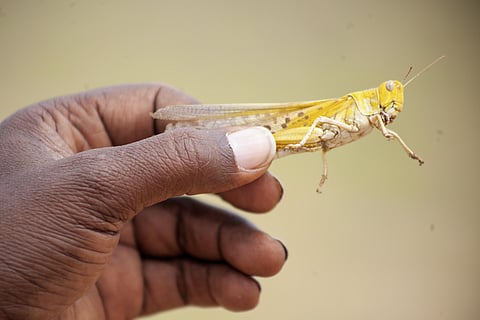

JAIPUR: Even as the Centre and the Rajasthan government focus on the coronavirus pandemic, a fresh crisis has erupted that’s causing sleepless nights for farmers in western Rajasthan.
Over the past 10 days, swarms of locusts from Pakistan have attacked crops in over a dozen districts of the desert state. Significantly, the damage this time is not confined only to border districts but has ruined crops even in Puskar region of Ajmer district, nearly 500 kms from the international border.
On Monday evening, the claims of the Agriculture department that locusts had left Pushkar were exposed badly as swarms of locusts attacked farms in nearby areas.
As the locusts swirled around, people reached their terraces to catch a glimpse of this unusual sight. Later, farmers in villages like Tilora, Ganahera, Waasni and Chavandiya Nala had to light up bonfires to try and disperse the locusts threatening their crops.
As a former Sarpanch of Ganahera village, Mangi Lal said, "The locusts were so many in number that branches of many trees got broken. Villagers are lighting bonfires or spraying insecticides to somehow get rid of these locusts. We have never seen such a threat from these locusts as in the last few days."
Later, swarms of locusts were even spotted in Kolayat block of Bikaner district on Monday evening. As the Ward Panch of Bhawanpura panchayat, Bhanwar Singh said, "The locusts have caused us losses of lakhs by ruining our crops of vegetables and local fruits."
The locusts attack for 2020 began on May 2 when some swarms entered into Indian side from Pakistan. The locusts have damaged crops in about 9,000 hectares in districts of like Sriganganagar, Jaisalmer Barmer, Jodhpur and Nagaur over the past 10 days.
Experts anticipate the bigger danger of locust attacks from Pakistan in June.
The UNO and FAO have already warned India and Pakistan that locusts have bred in larger numbers in the desert areas of Pakistan which may lead to vicious attacks in the border regions of India.
Lots of locusts are concentrated in the Sindh and Punjab areas of Pakistan and are crossing over to India in search of green fields.
As Dr. K L Gurjar, Deputy Director of Locust Warning Organisation in Jodhpur says ''There is a scarcity of greenery on the Pakistan side. The locusts are always in search of greenery and that's why they have come into India and are likely to keep coming in the next few weeks.''
Locusts are collection of certain species of short-horned grasshoppers that have a swarming phase. These insects are usually solitary but in some circumstances, they become abundant and gregarious.
It's in the gregarious phase that locusts form swarms that can devastate crops and pastures.
Locusts eat leaves, flowers, fruits, seeds, bark and also destroy plants by their sheer weight as they descend in massive numbers.
Last winter too, locusts had destroyed Rabi crops worth several crores in ten desert districts of Rajasthan.
In the Video Conference with PM Narendra Modi on Monday, Chief Minister Ashok Gehlot had raised this issue and asked for help from the Centre to check the locust menace that threatens crops and farmers in a dozen districts of Rajasthan.